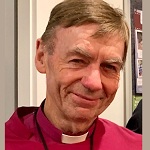 A reflection for All Saints and All Souls Days 2019 by Bishop Philip Huggins
A reflection for All Saints and All Souls Days 2019 by Bishop Philip Huggins
In Meg Wroe’s painting of Rublev’s Trinity, we are invited to come to the table of divine hospitality in all our uniqueness. That is, in all our particularity.
Rublev’s original and famous painting sits above the grave of St Sergius, the Russian saint who worked with wood, like the boy Jesus with Joseph.
St Sergius’ faithful life led him to say for our encouragement, “The contemplation of God dissolves all enmity”.
 |
| ‘Trinity-after Rublev’ by Artist Meg Wroe, 2016. |
Hence the three figures have real faces. Meg Wroe paints in London and these are faces from the streets of London.
Meg is saying to us, God does not invite “humanity” into communion, just in some generic sense.
God invites us in all our uniqueness.
We see this time and again in the Gospels, as Jesus goes about: Zacchaeus up a tree; the rich young man; Mary and Martha; the fishermen and Matthew as he is collecting taxes; the woman who anointed Jesus and the one who touched his cloak so she could be healed....
On and on it goes.
Said St John of the Cross, Spanish mystic of the 16th century, “God leads every soul by a separate path”.
We are all invited to be attentive to the ongoing invitation and thus to keep seeking to be true to our own unique self.
Offering worship recently in Balaclava, the Jewish area of Melbourne, I have been re- reading Martin Buber, that wonderful Jewish philosopher of “I and Thou”.
In 1919, Martin Buber wrote to himself (and us): “You shall not withhold yourself.” ... “You, imprisoned in the shells in which society, state, church, school, economy, public opinion and your own pride have stuck you.” ... “Indirect one among indirect ones, break through your shells, become direct” ....
And so he thereafter lived, this Jewish scholar - like Rabindranath Tagore of India and today’s Arundhati Roy; like Rumi and Matsuo Basho who reminds us that “Every day is a journey and the journey itself is home “ (on a birthday card from Liz)…Just to name a few of those many, drawn to uniquely live and convey God’s beauty, truth and kindness.
When he died in 1965, and here is the key, it was said that because Martin Buber lived, there is more love in the world than there would have been without him.
He broke through those imprisoning shells and became able to live and love more freely.
It is quite a journey to appreciate one’s own uniqueness before God, stop imitating others and pretending to be what we are not.
Like Martin Buber and many other souls, it takes attentiveness to come to some self-acceptance, some sense of what gives us purpose, what makes us feel happy about ourselves. This personal honesty, transformation and enjoyment meant Martin Buber could spread love around.
As St John of the Cross also reminds us, “In the twilight of life, God will not judge us on our earthly possessions and human successes but rather on how much we have loved”.
Why am I writing like this now, you may wonder?
It could stand as a generic reflection on this weekend of All Saints and All Souls Days, but there is a personal edge.
This Saturday morning at the Holy Eucharist in Pt Lonsdale Cemetery, I remembered many loved ones whom we have trusted to God’s eternal care, both long ago and very recently. These remembrances included loved ones in the Pt Lonsdale Cemetery: my parents and my mother’s sister Wyn and her husband Jim.
Jim and Wyn, with their dear children, were once very kind to me when I visited them in Fiji, where Jim then managed the ANZ Bank. I was an economic student at University and in a fog about my direction. This coming Wednesday, I go back to Fiji for the first time since then.
The whole hope of the meetings I will attend is very practical and loving: how can we all - Governments and people of faith of the Pacific and of Australia, better help each other? We are always having to learn how better we can co- operate to prevent climate change, violence and war, inequality in its various forms.
There is a lot of wonderful co- operation taking place. We must accelerate the pace, stepping free together of those various “imprisoning shells”, which Martin Buber described so well.
As some of our school children sang to us recently and afresh (in a video soon to be released for more to see): “What the world needs now is love…. It’s the only thing there is just too little of”…
With prayers and love this All Saints and All Souls weekend,
Bishop Philip Huggins
President, NCCA












